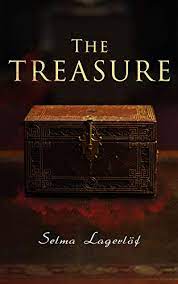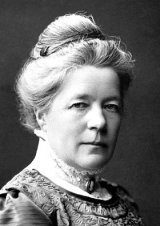The Treasure Page #18
The Treasure is a 1904 novel by the Swedish writer Selma Lagerlof. Its original Swedish title is Herr Arnes penningar, which means "Mr. Arne's money". It has also been published in English as Herr Arne's Hoard. Set in Bohuslän in the 16th century, it tells the story of a group of Scottish mercenaries who escape from prison; they go on to murder a family to steal a treasure chest, after which one of them falls in love with the family's sole survivor.
The skipper could not endure this sight. "Shall I be counted the friend of murderers and evildoers?" he said. "Can I close my eyes and refuse to see why God keeps the gates of the sea barred against my vessel? Shall I be destroyed for the sake of the unrighteous who have taken refuge with me?" And the skipper went forward and said to his men: "Now I know why we have been held back while all other ships have put to sea. It is because we have murderers and evildoers on board." Then the skipper went to the Scottish men-at-arms, who still lay asleep in the ship's hold. "Listen," he said to them; "keep you quiet yet awhile, no matter what cries or tumult you may hear on board. We must follow God's commandment and not suffer evildoers amongst us. If you obey me I promise to bring you the chest which holds Herr Arne's money, and you shall share it among you." But to Torarin the skipper said: "Go down to your sledge and cast your fish out on the ice. You shall have other freight anon." Then the skipper and his men broke into the cabin where Sir Archie and his friends slept. And they threw themselves upon them to bind them while they still lay asleep. And when the three Scotsmen tried to defend themselves, they smote them hard with their axes and handspikes, and the skipper said to them: "You are murderers and evildoers. How could you think to escape punishment? Know you not that it is for your sake God keeps all the gates of the sea closed?" Then the three men cried aloud to their comrades, bidding them come and help them. "You need not call to them," said the skipper. "They will not come. They have gotten Herr Arne's hoard to share amongst them, and are even now measuring out silver coin in their hats. For the sake of this money the evil deed was done, and this money has now brought retribution upon you." And before Torarin had finished unloading the fish from his sledge, the skipper and his men came down on to the ice. They brought with them three men securely bound. They were grievously hurt and fainting from their wounds. "God has not called on me in vain," said the skipper. "As soon as His will was clear to me, I hearkened to it." They laid the prisoners on the sledge, and Torarin drove with them by creeks and narrow sounds where the ice still lay firm, until he came to Marstrand. Now late in the afternoon the skipper stood on the lofty poop of his vessel and looked out to seaward. Nothing was changed around the vessel, and the wall of ice towered ever higher before her. Then the skipper saw a long procession of people coming out to his ship. All the women of Marstrand were there, both young and old. They all wore mourning weeds, and they brought with them a group of boys who carried a bier. When they were come to the gallias, they said to the skipper: "We are come to fetch a young maiden who is dead. Those murderers have confessed that she gave her life to hinder their escape, and now we, all the women of Marstrand, are come to bring her to our town with all the honour that is her due." Then Elsalill was found and brought down to the ice and borne in to Marstrand; and all the women in the place wept over the young maid, who had loved an evildoer and given her life to destroy him she loved. But even as the line of women advanced, the wind and waves broke in behind them and tore up the ice over which they had but lately passed; and when they came to Marstrand with Elsalill, all the gates of the sea stood open. THE END FOREWORD The Treasure is an opposite fairy tale, presenting Prince Charming as he really is: an orphan girl is cleaning fish and foreseeing her life of poverty; a man well-dressed in seductive splendor woos her and offers her ... forever after. There is only one catch: she must betray her sister. Although Selma Lagerlof won the Nobel Prize for literature in 1909, her name is known in this country--if at all--as author of a children's book only. All her other works, including novels and feminist essays, have been unavailable in English for almost fifty years. In 1911, she made a speech entitled "Home and State" to the International Woman Suffrage Alliance Congress. She argued, first, that the Home was the creation of woman and the place where the values of women were nourished and protected. The Home was a community where "punishment is not for the sake of revenge, but for training and education," where "there is a use for all talents, but [she] who is without can make [her] self as much loved as the cleverest." It was the "storehouse for the songs and legends of our fore-fathers," and, she said, "there is nothing more mobile, more merciful amongst the creations of [humankind]." Although not all homes are good, good and happy homes do sometimes exist. Men by themselves, on the other hand, were responsible for creating the State which "continually gives cause for discontent and bitterness." There has never been a State which could satisfy all its members, which did not ask to be reformed from its very foundations. Yet it is through the State that humankind will reach its highest hopes. Her conclusion: women must add their special virtues, what she calls "God's spirit," to the "law and order" goals of men. Selma Lagerlof's own home was a community of family and servants, within which she experienced profound affections--for the nursemaid who carried her as a crippled child upon her back, for the old housekeeper, her younger sister, her grandmother who told the children stories every afternoon. She never married; she spent her entire life within communities of women, and her career could be described as the author being handed up to greatness by a procession of women who gave encouragement, advice, editorial help, criticism, contacts, companionship. She called Frederika Bremer the first feminist and "last old Mamsell" of Sweden, meaning that Frederika Bremer's life's work had banished the "old maid" from the realm of pitiful figures. Selma Lagerlof was herself proof of her statement. In The Treasure, written midway between her farewell to Frederika Bremer and her plea for woman suffrage, the men are interested in money, murder, and revenge. They miss the evil apparent even to their dogs. When the old mistress (and who should know better that the home is threatened?) warns that knives are being sharpened two miles away, her lord refuses to believe that she could hear what he cannot. The fishpeddler's dog has instinct enough to balk and howl, sensing death; the fishpeddler's wife and the woman tavern-keeper respond to the supernatural however little they understand; the men turn their backs on understanding even when they are being implored.
Translation
Translate and read this book in other languages:
Select another language:
- - Select -
- 简体中文 (Chinese - Simplified)
- 繁體中文 (Chinese - Traditional)
- Español (Spanish)
- Esperanto (Esperanto)
- 日本語 (Japanese)
- Português (Portuguese)
- Deutsch (German)
- العربية (Arabic)
- Français (French)
- Русский (Russian)
- ಕನ್ನಡ (Kannada)
- 한국어 (Korean)
- עברית (Hebrew)
- Gaeilge (Irish)
- Українська (Ukrainian)
- اردو (Urdu)
- Magyar (Hungarian)
- मानक हिन्दी (Hindi)
- Indonesia (Indonesian)
- Italiano (Italian)
- தமிழ் (Tamil)
- Türkçe (Turkish)
- తెలుగు (Telugu)
- ภาษาไทย (Thai)
- Tiếng Việt (Vietnamese)
- Čeština (Czech)
- Polski (Polish)
- Bahasa Indonesia (Indonesian)
- Românește (Romanian)
- Nederlands (Dutch)
- Ελληνικά (Greek)
- Latinum (Latin)
- Svenska (Swedish)
- Dansk (Danish)
- Suomi (Finnish)
- فارسی (Persian)
- ייִדיש (Yiddish)
- հայերեն (Armenian)
- Norsk (Norwegian)
- English (English)
Citation
Use the citation below to add this book to your bibliography:
Style:MLAChicagoAPA
"The Treasure Books." Literature.com. STANDS4 LLC, 2025. Web. 5 Feb. 2025. <https://www.literature.com/book/the_treasure_6>.








Discuss this The Treasure book with the community:
Report Comment
We're doing our best to make sure our content is useful, accurate and safe.
If by any chance you spot an inappropriate comment while navigating through our website please use this form to let us know, and we'll take care of it shortly.
Attachment
You need to be logged in to favorite.
Log In